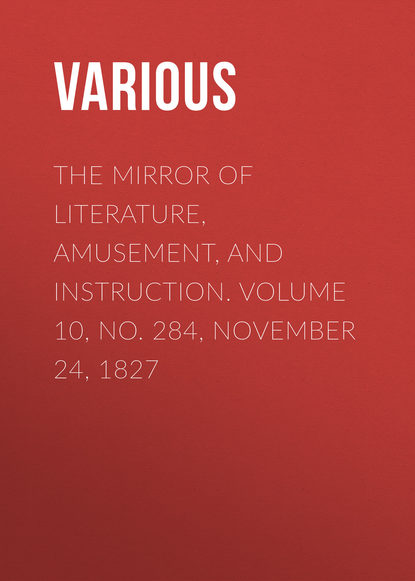По всем вопросам обращайтесь на: info@litportal.ru
(©) 2003-2024.
✖
The Mirror of Literature, Amusement, and Instruction. Volume 10, No. 284, November 24, 1827
Автор
Год написания книги
2018
Настройки чтения
Размер шрифта
Высота строк
Поля
BIOGRAPHICAL MEMOIR OF HELEN
Princess Helen was born of an egg,
And scarcely ten years had gone by,
When Theseus beginning to beg,
Decoyed the young chicken to fly.
When Tyndarus heard the disaster,
He crackled and thunder'd like Etna,
So out gallop'd Pollux and Castor,
And caught her a furlong from Gretna.
Singing rattledum, Greek Romanorum,
And hey classicality row.
Singing birchery, floggera, borum,
And folderol whack rowdy dow.
The newspapers puffed her each day,
Till the princes of Greece came to woo her,
Then coaxing the rest to give way,
She took Menalaus unto her,
So said they, "though we grieve to resign,
Yet if ever you're put to a shift,
Let your majesty drop us a line,
And we'll all of us lend you a lift.
With our rattledum, &c."
Menelaus was happy to win her.
But she soon found a cure for his passion,
By hobbing or nobbing at dinner,
With Paris, a Trojan of fashion.
This chap was a slyish young dog,
The most jessamy fellow in life,
For he drank Menalaus' grog,
And d—me made off with his wife.
Singing rattledum, &c.
The princes were sent for, who swore
They would punish this finikin boy;
So Achilles and two or three more,
Undertook the destruction of Troy.
But Achilles grew quite ungenteel,
And prevented their stirring a peg,
Till Paris let fly at his heel,
And he found himself laid by the leg.
With his rattledum, &c.
The Grecians demolish'd the city,
And then (as the poets have told)
Dame Helen might still be called pretty,
Though very near sixty years old.
Menelaus, when madam was found,
Took her snugly away in his chaise,
So Troy being burnt to the ground,
Why the story goes off with a blaze.
And a rattledum, &c.
HORSE-CHESTNUTS
(To the Editor of the Mirror.)
In a recent number there was a notice of the uses of the Esculus Hippocastaneus, or horse chestnuts; but a very important one was omitted, namely, its substitution occasionally for Peruvian bark in cases of intermittent fever. This disorder, known better by the name of ague, had been formerly epidemic in Ireland, where the humidity of the atmosphere is continually increased by the exhalation of the lochs and bogs with which the country abounds. In consequence, however, of the formation of the Grand and Royal Canals, and the drainage of the waters in their vicinity, the tendency to this disease was greatly lessened; and about twenty years ago the disorder was so rare in Dublin and the neighbourhood, that the medical students often complained that they graduated without ever having an opportunity of seeing in the hospitals a single case of this once almost universal disorder. In consequence, however, of the extreme wetness of one summer and autumn, agues again resumed their ascendancy, and the hospitals and dispensaries became crowded with intermittent patients, and all the bark of the druggists and apothecaries was put into requisition; but to the surprise and disappointment of all the medical men, this infallible specific was altogether inert and powerless, and after repeated trials and disappointments, it was abandoned as useless. It was now a matter of importance to ascertain the cause of this extraordinary failure, whether it arose from the altered character of the complaint, or from the deteriorated quality of the medicine; and it was found to be the latter. In consequence of the long cessation of intermittent fever, bark had been little used or called for, and the stock had remained so long on hand, that it had become effete and worthless. It was necessary then to try some substitute. Quassia-wood, the acorus calamus, and other bitters and aromatics, were tried; but that which seemed to succeed best was the bark and kernel of the horse-chestnut. The nut was moderately dried in a stove, so as to be capable of being powdered, and in that state was exhibited in substance with cayenne pepper and other aromatics. The bark was taken in infusions and decoctions with quassia, and the effects were sometimes very decided and satisfactory, forming a providential substitute for the only kind of bark then to be procured in Ireland.
W.
SONNET
(For the Mirror.)
Say what repays the gamester's nightly toil,
Can hell itself more hideous woes impart?
Can glitt'ring heaps of ill-begotten spoil,
Appease the cravings of his callous heart?
For this alone he severs every tie,
For this he marks unmov'd the orphan's tear,
E'en nature's charms, a smile from beauty's eye
No longer can his blasted prospects cheer.
But now prevails the dice's rattling sound,
The loud blaspheming oath, and cry of woe,
From tables set with spectre forms around,
Hurrying with frantic haste, th' expected throw!
Than this no greater foe to man remains
This is the mightiest triumph Satan gains!
E.L.
ORIGINAL TRANSLATIONS
(For the Mirror.)
Horace.—Ode xxx.—B. 1
TO VENUS
He invokes her to be present at Glycera's private sacrifice
Venus! leave thy loved isle,
And on Glycera's altar smile;
Breathing perfumes hail the day,
Haste thee, Venus! haste away.
Bring with thee the am'rous boy;











